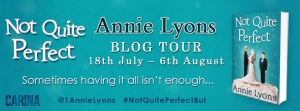
Today I'm very lucky to be hosting a guest post from the very lovely Annie Lyons as part of her blog tour to celebrate her bestselling novel Not Quite Perfect being released in paperback.
I’m starting a Revolution
When was the last time you wrote a letter? I would like to say that I just have but I’m not sure if the hastily scribbled note enclosed alongside a claim for osteopath treatment actually counts.
I’m talking about the kind of letter your parents or grandparents would have written long before the digital age engulfed us; words carefully constructed on sheets of Basildon Bond neatly held over a lined ‘underpage’ enabling you to write in a straight line.
My mother still has a letter drawer in a dresser in the dining room. It contains old letters, writing paper, envelopes, a fat green address book with gold gilt writing nestled in its original cardboard box and a letter opener. My father uses the letter opener every day. It’s shaped like a dagger and my six-year-old son is fascinated by it. When he opens the drawer to retrieve it, there’s a smell of sweet wood mingled with the scent of treasured old letters; words of love, care and sadness from the past. It’s heady.
This isn’t to say that I dislike other forms of communication. E-mails are fantastic but wildly overused. Social media is amazing but it has its time and place. Texting is brilliantly convenient but it’s not exactly the place for Shakespeare’s Sonnet 18. I’m not averse to a smiley face or a Megalol and I don’t think every communication should be a work of poetry either. The digital age has a lot to offer but my goodness it’s an exhausting place. I can’t help feeling that we need to take a break from the chit-chat world we live in and allow our brains to rest and settle a little.
Typing at a computer or jabbing at your phone is a fundamentally different exercise to sitting at beautiful huge walnut writing desk overlooking a delightfully blooming garden as you lay down your worldly thoughts for another person. What? I dream for a living, okay? Kitchen tables are also fine.
I think it’s partly the physical act of letter-writing that makes it so special. Consider for a moment; here I sit, typing my ideas for you to read and every word is delivered by me effectively stabbing at the keyboard, punching out my thoughts. This works beautifully when you need to get your words down quickly. Plus I can delete, re-jig and re-form with ease, which is a blessing. You wouldn’t want to read my first drafts. Not even I want to read my first drafts. Writing on the computer is contained and focussed; it’s efficient, enabling me to box my ideas and assemble them into some sort of order.
Putting pen to paper is entirely different. As a writer, there are times when I need to let my brain spill over like an over-risen soufflé. I want to set it free from contained thought and explore its deepest recesses. That’s when I retrieve my latest notebook and my favourite pen. I often go and sit in a coffee shop to remind myself what real people look like. I watch and listen and sometimes write nothing at all. But often I will find myself noticing a couple of people and I will try to invent a story about them. And when I put pen to paper, the sheer act of writing on a page allows my brain to open up in a way that my keyboard often does not.
It’s the same process with letter-writing. The conscious act of opening a pad of note-paper, writing the date and address, and beginning, ‘Dear,’ is very intimate. It takes care and attention because you are writing to one person. Every word counts. You need to linger as you write. There is little room for deleting or editing. You are holding a one-way conversation with the recipient but because it is one-way, you will can share your innermost thoughts without fear of contradiction or interruption.
In turn, to receive a hand-written letter is uniquely special. These days, the letters I receive are usually from older friends or relatives and the letter is often a card but still, the physical act of opening and reading a note from someone who has taken the time to write to you is a treasured moment. Sometimes, the letters will make you laugh, other times they will make you cry but they will always make you stop for a moment longer than usual and think about the writer and what they mean to you.
When I was a student, I lived in Munich for a year. For the first few months I was desperately homesick, living in another family’s house, trying to come to terms with the language and culture. One of my university friends used to write to me. She would recount tales of the house she was now sharing with fellow-students; of their various exploits and catastrophes. These were delivered with such humour that if I received one in the morning, I would save it for the evening when I could lie on my bed propped up by the flattest pillow known to man and laugh until the tears rolled down my cheeks and my stomach ached. For me they were a godsend and even twenty years on, I can remember the comfort I felt at the sight of her hand-writing. Someone was thinking about me and cared enough to let me know.
This is an inferior example when you compare it to the impact letters have had during wars over the centuries. The letters sent between soldiers at the front and people back home during the two World Wars were quite literally matters of life and death. When you read the well-documented array of letters between sweethearts, from mothers to sons, from fathers to their children, you understand what it is to be human. The mundane details of people’s lives are there offering a distraction to the sheer awfulness of the situation, but most of the letters begin and end with love. They are declarations of the heart, pure and true because when you are facing the very real possibility of death, what else remains but love?
Letter-writing has always been inextricably linked to love. True, there are such things as poison-pen letters but these days the internet seems to be the place where people choose to spew their hate-filled bile. Maybe this means that the hand-written letter can be reserved for love and care. I hope so.
When my father in law died, his wife received over a hundred letters and cards; handwritten notes filled with kindness and love. Not e-mails or texts but words on a page doing their best to convey sympathy and offer comfort. She reads them from time to time even now because they remind her of the person she loves and misses still.
When I was a child, my mother encouraged me to write thank you letters after every birthday and Christmas. I didn’t need much encouragement. I loved using my Paddington Bear stationery set (who wouldn’t?) and I followed her guidance carefully. Address on the right, date on the left. Dear whoever, thank you very much for the (detail gift here). Now write a sentence about why you like the gift and tell the recipient about what you did to celebrate. Finally, thank them again and wish them well. I still write letters of thanks and encourage my children to do the same. It feels like an important ritual; part of my family heritage and something that is worth preserving.
Writers love letters almost as much as they love books. They are laced with possibility. They can hide secrets or reveal truths, they can upset, thrill and gladden. They are a window to the soul.
Letters were uppermost in my mind when I came up with the idea for Dear Lizzie. I wanted to write about two very different but completely devoted sisters. Bea Harris is the strong one, the one who always knows what to do. Her sister, Lizzie is the polar opposite, estranged from her family, lonely and alone. Bea has been her only support through life and when she dies, Lizzie wonders how she will cope. Her sister leaves her a package of letters containing her final wishes; wishes that she hopes will help Lizzie find happiness but wishes that will also reveal some difficult truths.
When Lizzie reads Bea’s letters month by month, she discovers comfort in her sister’s written words. The sight of her handwriting and the fact that she is holding a letter that her sister once held makes her feel as if Bea is still with her in a way, guiding and counselling her through life. They take her on a journey which changes her life forever.
Of course, you don’t have to be life-changing when you write a letter. It can just remind people that you love them or are thinking about them. In the ubiquitous world of e-mail, it is special and rare; a treasure to be preserved.
I hope we can hold on to the art of letter writing. In this busy, immediate world they offer respite. They enable us to pause, reflect and record important things that need to be said; thoughts and fears and hopes. They offer comfort and love and show us the essence of the person who wrote them.
So I am proposing a mini-revolution right now. Why don’t you dig out that old note-pad or treat yourself to a new one and put pen to paper? Let’s all write a letter to someone we love. Let’s take a moment to reflect about them and what they mean to us and let’s tell them. Let’s take a break from the chaos and feed the soul. Who knows where that revolution might take us?
Annie Lyons is the best-selling author of Not Quite Perfect (now available in paperback) and Not Quite Perfect Christmas (A Short Story). Her new novel Dear Lizzie is published by Carina and is available as an eBook.
http://www.carinauk.com/annie-lyons
http://www.facebook.com/annielyonswriter
Twitter @1AnnieLyons
https://www.goodreads.com/annie_lyonswrites

No comments:
Post a Comment